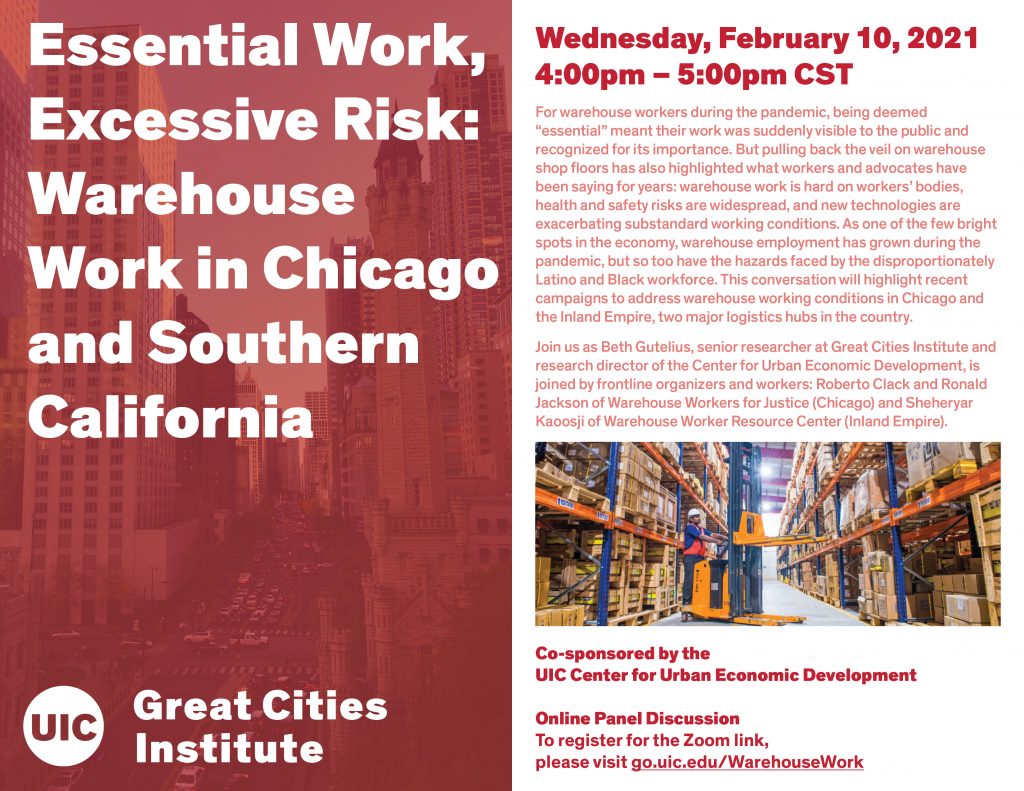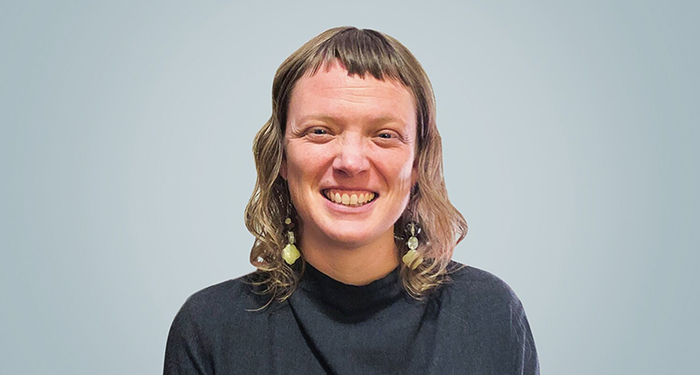Our Chicago: Voices of the community town hall examines discriminatory effects of redlining
Matt Wilson, Senior Research Specialist with Great Cities Institute, participated in a panel discussion ABC 7 Chicago’s Our Chicago program which examined “the long lasting effects of the discriminatory real estate and banking practices of redlining.”
Redlining meant that Black residents, despite having all the necessary collateral and ability to pay, could not secure a home for purchase because of their neighborhood “color designation.” The historic practice of redlining, with some roots in Chicago’s real estate and financial community, had lasting consequences that not only kept Blacks out of desirable neighborhoods, but was instrumental in stifling school integration, opportunities for economic development, corporate development and access to healthcare.
See the Panel Discussion on ABC 7 Chicago
Chicago Data Training: Using Microdata from the American Community Survey
This is a recording of the February 15, 2021 workshop with Rob Paral.
What Is the Training? This is an online 1.5 hour training on a type of Census Bureau data called “microdata.”
What is Microdata? “Microdata” are individual person and household responses to the American Community Survey. The data are stripped of personal identifiers. This is the kind of data used to describe, for example, poverty, education or employment among very specific groups like seniors, immigrants, African Americans or others.
What Will the Training Do? This training explains what microdata are, how to access the data, and how to use and display the data.
Do I Need to Use Special Software or Know How to Code? No, to make things simple, the training uses a free service of IPUMS-USA at the University of Minnesota. You can create a free account at usa.ipums.org.
Who Is the Instructor? Rob Paral is a fellow at UIC Great Cities and a past lecturer in the UIC Latin American and Latino Studies Program. Rob has many years of working with Chicago data. His Chicago community area data are widely used, and may be seen at robparal.com
Essential Work, Excessive Risk: Warehouse Work in Chicago and Southern California
For warehouse workers during the pandemic, being deemed “essential” meant their work was suddenly visible to the public and recognized for its importance. But pulling back the veil on warehouse shop floors has also highlighted what workers and advocates have been saying for years: warehouse work is hard on workers’ bodies, health and safety risks are widespread, and new technologies are exacerbating substandard working conditions. As one of the few bright spots in the economy, warehouse employment has grown during the pandemic, but so too have the hazards faced by the disproportionately Latino and Black workforce. This conversation will highlight recent campaigns to address warehouse working conditions in Chicago and the Inland Empire, two major logistics hubs in the country.
Join us as Beth Gutelius, senior researcher at Great Cities Institute and research director of the Center for Urban Economic Development, is joined by frontline organizers and workers: Roberto Clack and Ronald Jackson of Warehouse Workers for Justice (Chicago) and Sheheryar Kaoosji of Warehouse Worker Resource Center (Inland Empire).
Co-sponsored by the UIC Center for Urban Economic Development and GCI’s Latino Research Initiative.
Essential Work, Excessive Risk: Warehouse Work in Chicago and Southern California
Recording of the February 10, 2021 discussion with Beth Gutelius, Roberto Clack, Ronald Jackson, and Sheheryar Kaoosji.
For warehouse workers during the pandemic, being deemed “essential” meant their work was suddenly visible to the public and recognized for its importance. But pulling back the veil on warehouse shop floors has also highlighted what workers and advocates have been saying for years: warehouse work is hard on workers’ bodies, health and safety risks are widespread, and new technologies are exacerbating substandard working conditions. As one of the few bright spots in the economy, warehouse employment has grown during the pandemic, but so too have the hazards faced by the disproportionately Latino and Black workforce. This conversation highlighted recent campaigns to address warehouse working conditions in Chicago and the Inland Empire, two major logistics hubs in the country.
Here are the links to reports mentioned in the video:
https://laborcenter.berkeley.edu/future-of-warehouse-work/
http://www.ww4j.org/uploads/7/0/0/6/70064813/wwj_food_workers_report-2-1.pdf
Thank you to CAN TV (cantv.org) for recording.
Beth Gutelius to share her research with warehouse organizers amidst the COVID-19 pandemic
For warehouse workers during the pandemic, being deemed “essential” meant their work was suddenly visible to the public and recognized for its importance. But pulling back the veil on warehouse shop floors has also highlighted what workers and advocates have been saying for years: warehouse work is hard on workers’ bodies, health and safety risks are widespread, and new technologies are exacerbating substandard working conditions. As one of the few bright spots in the economy, warehouse employment has grown during the pandemic, but so too have the hazards faced by the disproportionately Latino and Black workforce.
Beth Gutelius is a Senior Researcher here at Great Cities Institute and research director for the UIC Center for Urban Economic Development. She has been at the forefront of documenting the impacts of COVID-19 and the ensuing increase in online ordering that has put a strain on the lives of warehouse workers. She has been quoted in many recent news articles on the subject of warehouse work, along with her research partner, Nik Theodore:
WBEZ – Warehouse And Factory Workers Make Their Case For Priority Access To The COVID-19 Vaccine
NBC News – Warehouse workers pushed to their limit as holiday orders — and coronavirus cases — surge
Washington Post – Overworked and exhausted, warehouse workers brace for a frenzied holiday rush
WAMU-FM – How Hourly and Gig Workers Are Grappling With Coronavirus
Santa Fe Reporter – The future of work is an open question
KIRO Radio – Automation is Making Warehouse Work Harder, Not Smarter
Vox Media – Robots aren’t taking warehouse employees’ jobs, they’re making their work harder
Join Beth as she discusses with frontline organizers and workers from Warehouse Workers for Justice (Chicago) and the Warehouse Worker Resource Center (Inland Empire) about the continuing hazards warehouse workers are facing. This conversation will highlight recent campaigns to address warehouse working conditions in Chicago and the Inland Empire, two major logistics hubs in the country.
Register for the online Zoom conversation here. The talk will take place on Wednesday, February 10 at 4pm central time.
Co-sponsored by the UIC Center for Urban Economic Development and GCI’s Latino Research Initiative.
Shaping the Next Stage of our History
History is always in the process of being shaped – and with the lessons that we had the opportunity to learn during 2020, we have much to do to shape a better, healthier and more equitable world.
First, we want to first offer our deepest condolences to the many families and friends who lost loved ones during this highly infectious pandemic. We share with you your pain and grief.
We acknowledge also the many health care workers who, for months, have been engaged in risky and grueling work that demonstrates the most honorable depths of giving that is so essential to a healthy community. By now, many of us know of Dr. Marina del Rios, emergency medicine physician from University of Illinois Health who has worked so hard throughout this pandemic. When we expressed our respect to her, she responded, “I do it out of love.” Yes, love. It surely takes a deep kind of love and commitment that has been forthcoming from our frontline health care workers. We offer to you our deepest appreciation and acknowledgment of the sacrifices that you have made. We wish you good health and moments of relaxation. Thank you.
We thank all those who work on behalf of our safety.
We also thank public health officials and the many scientists and mathematicians who worked tirelessly to provide us information and eventually the vaccine. We wish more people had and would listen to you.
While many of us, particularly in professional occupations, were able to work from home, we were able to do so because of the essential workers who kept things moving – including our goods and services. My goodness, without you, we could not have functioned in the last few months. Thank you, thank you. Yet, we also know that you literally risked your health and lives and, in many instances, suffered for it. A most important truth emerging from this crisis is an acknowledgement of what is owed to those who work in warehouses, delivery, manufacturing, food services, public utilities, transit etc. Thank you also to farmworkers. You all deserve the pay, the benefits and the respect for your work that is so essential to our society.
If you want to read more about warehouse workers, check out the report authored by Beth Gutelius, Great Cities Institute Research Specialist and Associate Director of UIC Center for Urban and Economic Development (CUED) and Nik Theodore, GCI Fellow, Professor and Chair of Urban Planning and Policy, and Director of the Center for Urban Economic Development.
Please look forward to hearing more from us in 2021 about essential workers.
We have been amazed at the social-minded folk from non-profit groups and mutual aid networks who have distributed food and provided tutoring, translation and a whole array of services. You have been relentless in your service to your communities and we salute you.
We acknowledge the pain of vulnerable populations that disproportionately suffered the impacts of the pandemic. Hardest hit were Blacks and Latinos; elderly, especially those concentrated in nursing homes; children, youth and families living in high poverty communities; those who lost their jobs; domestic workers; undocumented immigrants; homeless; those confined in dangerous situations such as those domestically abused, the incarcerated, and aging populations without resources; persons with disabilities, and so many others. Notably, widespread social and economic disparities were amplified during this time of disaster.
We also know that it is more difficult for vulnerable populations to recover and more likely to experience long-term negative consequences from acute disasters such as this pandemic. We applaud – and helped where we could – the public and private efforts to meet the needs of those populations that, because of systemic disparities that preceded this crisis, were made more vulnerable during it.
Serving vulnerable populations amidst this crisis is in the collective interest of Illinoisans. It not only helps stem the tide of this pandemic; it fosters the compassion and gratitude on which a healthy society is built. Thank you to those who have advocated throughout this pandemic for these populations to be better served.
The experience of the COVID-19 pandemic provides lessons for creating emergency management plans that meet the needs of populations made more vulnerable by a crisis. Emerging from this crisis should be the commitment that all emergency management plans should include actions for addressing the needs of vulnerable populations. Non-profit social service delivery organizations and relevant government agencies are key to identifying needs and generating proposed solutions.
The best disaster mitigation measures with respect to vulnerable populations, however, require policies and practices that reduce disparities by tackling their underlying causes.
2020 is also the year that many people woke up to the realization of the stark and devastating conditions and consequences of racial and income disparities that are rampant in this country. The hundred of thousands of social protestors who came into the streets this summer, expressed for many, the outrage over the murder of George Floyd, as well as other black and brown members of our society to whom we owe the obligation of justice. The fight for justice will be integral to our work of building a better, healthier and equitable society.
Going forward, we have many reasons to have hope and there are many who have come before us that never gave up the struggle.
Perhaps the most important lesson of 2020 is that our clearest path to a better society involves our mutual commitment to the greater good – the public good – and the health of one another.
We wish you the best winter solstice and holiday season that you can muster. We wish you joy, peace and health.
Thank you,
Great Cities Institute
Teresa Córdova, Director
Warehouse workers pushed to their limit as holiday orders — and coronavirus cases — surge
A NBCNews.com article on health and safety issues facing warehouse workers amid the pandemic and the busy holiday season includes comments from Nik Theodore, UIC professor and head of urban planning and policy, director of the Center for Urban Economic Development and fellow at the Great Cities Institute.
“These are risky front-line jobs because of the amount of people in one place, and social distancing is not always possible,” said Nik Theodore, a professor at the University of Illinois at Chicago’s urban planning and policy department. He added that it’s clear that warehouse workers are “a vulnerable population.”
Warehouse And Factory Workers Make Their Case For Priority Access To The COVID-19 Vaccine
Nik Theodore, GCI fellow, director of the Center for Urban Economic Development, and professor of urban planning and policy, is quoted in a WBEZ article on the need for warehouse and factory workers to be prioritized for receiving the COVID-19 vaccine during the busy holiday season.
“Warehouses across the country have become COVID-19 hotspots,” said Nik Theodore, a professor and labor policy expert at the University of Illinois at Chicago. “It means that those frontline workers are bearing the brunt of this pandemic.”
Theodore noted that warehouse workers are working long hours during the holiday season. He said those workers are vulnerable and need protection.
“Online holiday shopping is projected to increase by 33% this year,” said Theodore, adding that warehouse workers in the Chicago metropolitan area handle online orders from throughout the Midwest.
Full Story from WBEZ
Platform Power to the People
In a co-authored cover story for the Stanford Social Innovation Review winter issue, Beth Gutelius, associate director of the Center for Urban Economic Development at UIC and senior researcher at the Great Cities Institute at UIC, writes that the COVID-19 pandemic has shown how digital tools can foster online engagement that leads to real benefits for working people.






